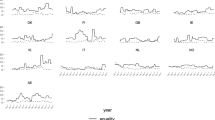Abstract
Although the links between political attitudes and political participation have been extensively studied, there is limited understanding of attitudinal transformation following different types of political engagement. This study differentiates between non-radical and radical political participation and explores their respective impact on political interest, external political efficacy, and internal political efficacy. A three-wave dataset collected from a sample of Hong Kong youth was adopted to assess three cross-lagged models. Regarding the link between attitudes and participation, we only found that internal political efficacy played a positive role in predicting radical political participation. Regarding the link between participation and attitudes, the results showed that radical political engagement positively predicted political interest and negatively predicted external political efficacy; non-radical political engagement promoted internal political efficacy. Our findings offer valuable implications for Hong Kong policy makers, educators, and social workers who care about the positive development of local youth following their engagement in political activities and hope to promote effective political communication.



Similar content being viewed by others
References
Abdu, S. D., Mohamad, B., & Muda, S. (2017). Youth online political participation: The role of Facebook use, interactivity, quality information and political interest. SHS Web of Conferences, 33, 1–10.
Ajzen, I. (1991). The theory of planned behavior. Organizational Behavior and Human Decision Processes, 50(2), 179–211.
Augustin-Jean, L., & Cheung, A. H. (2018). The economic roots of the umbrella movement in Hong Kong: Globalization and the rise of China. Abingdon, UK: Routledge.
Bakker, T. P., & De Vreese, C. H. (2011). Good news for the future? Young people, internet use, and political participation. Communication Research, 38(4), 451–470.
Bandura, A. (1986). Social foundations of thoughts and action: A social cognitive theory. Englewood Cliffs, NJ: Prentice-Hall.
Beaumont, E. (2011). Promoting political agency, addressing political inequality: A multilevel model of internal political efficacy. The Journal of Politics, 73(1), 216–231.
Becker, J. C., & Tausch, N. (2015). A dynamic model of engagement in normative and non-normative collective action: Psychological antecedents, consequences, and barriers. European Review of Social Psychology, 26(1), 43–92.
Bem, D. J. (1972). Self-perception theory. Advances in Experimental Social Psychology, 6, 1–62.
Cangur, S., & Ercan, I. (2015). Comparison of model fit indices used in structural equation modeling under multivariate normality. Journal of Modern Applied Statistical Methods, 14(1), 152–167.
Chan, C. P. (2016). Post-umbrella movement: Localism and radicalness of the Hong Kong student movement. Contemporary Chinese Political Economy and Strategic Relations: An International Journal, 2(2), 885–908.
Chinese University of Hong Kong. (2019). Demographic profile of protest participants in Hong Kong. Hong Kong: The Chinese University of Hong Kong.
Condon, M., & Holleque, M. (2013). Entering politics: General self-efficacy and voting behaviour among young people. Political Psychology, 34(2), 167–181.
Deci, E. L., & Ryan, R. M. (2000). The" what" and" why" of goal pursuits: Human needs and the self-determination of behavior. Psychological Inquiry, 11(4), 227–268.
De Zúñiga, H. G., Diehl, T., & Ardévol-Abreu, A. (2017). Internal, external, and government political efficacy: Effects on news use, discussion, and political participation. Journal of Broadcasting & Electronic Media, 61(3), 574–596.
Eccles, J. S. (2005). Subjective task value and the Eccles et al. model of achievement-related choices. In A. J. Elliot & C. S. Dweck (Eds.), Handbook of competence and motivation (pp. 105–121). New York, NY: Guilford Press.
Festinger, L. (1962). A theory of cognitive dissonance. Redwood City CA: Stanford University Press.
Festinger, L., & Carlsmith, J. M. (1959). Cognitive consequences of forced compliance. Journal of Abnormal and Social Psychology, 58, 203–210.
Gastil, J., & Xenos, M. (2010). Of attitudes and engagement: Clarifying the reciprocal relationship between civic attitudes and political participation. Journal of Communication, 60(2), 318–343.
Genova, C. (2018). Youth activism in political squats between centri sociali and case occupate. Societies, 8(3), 77–102.
Harmon-Jones, E., & Harmon-Jones, C. (2002). Testing the action-based model of cognitive dissonance: The effect of action orientation on postdecisional attitudes. Personality and Social Psychology Bulletin, 28(6), 711–723.
Harmon-Jones, E., & Mills, J. (2019). An introduction to cognitive dissonance theory and an overview of current perspectives on the theory. In E. Harmon-Jones (Ed.), Cognitive dissonance: Reexamining a pivotal theory in psychology (pp. 3–24). Washington, DC: American Psychological Association.
Hoffman, L. H., & Thomson, T. L. (2009). The effect of television viewing on adolescents' civic participation: Political efficacy as a mediating mechanism. Journal of Broadcasting & Electronic Media, 53(1), 3–21.
Hooghe, M., & Wilkenfeld, B. (2008). The stability of political attitudes and behaviors across adolescence and early adulthood: A comparison of survey data on adolescents and young adults in eight countries. Journal of Youth and Adolescence, 37(2), 155–167.
Hope, E. C., & Jagers, R. J. (2014). The role of sociopolitical attitudes and civic education in the civic engagement of black youth. Journal of Research on Adolescence, 24(3), 460–470.
Inkstone. (2019). Voter registration spikes in Hong Kong amid protests. https://www.inkstonenews.com/politics/hong-kong-protests-youth-voter-registration-spikes-amid-anti-government-unrest/article/3021139
Kim, M. (2018). How does Facebook news use lead to actions in South Korea? The role of Facebook discussion network heterogeneity, political interest, and conflict avoidance in predicting political participation. Telematics and Informatics, 35(5), 1373–1381.
Korthagen, F. A. J. (2013). A focus on the human potential. In F. A. J. Korthagen, Y. M. Kim, & W. L. Greene (Eds.), Teaching and learning from within: A core reflection approach to quality and inspiration in education (pp. 13–23). New York: Routledge.
Kwong, Y. H. (2016). State-society conflict radicalization in Hong Kong: The rise of ‘anti-China’ sentiment and radical localism. Asian Affairs, 47(3), 428–442.
Lam, W. M. (2003). An alternative understanding of political participation: Challenging the myth of political indifference in Hong Kong. International Journal of Public Administration, 26(5), 473–496.
Lam-Knott, S. (2019). Responding to Hong Kong’s political crisis: Moralist activism amongst youth. Inter-Asia Cultural Studies, 20(3), 377–396.
Lao, J., & Kuhn, D. (2002). Cognitive engagement and attitude change. Cognitive Development, 17, 1203–1217.
Lee, K. M. (2006). Effects of internet use on college students' political efficacy. Cyberpsychology & Behavior, 9(4), 415–422.
Lee, A. (2012). Scholarism's Joshua Wong embodies anti-national education body's energy. South China morning post 10 September.
Lee, F. L., & Chan, J. M. (2012). Activating support for social movements: The effect of the internet on public opinion toward social movements in Hong Kong. Taiwan Journal of Democracy, 8(1), 145–167.
Levy, B. L., & Akiva, T. (2019). Motivating political participation among youth: An analysis of factors related to adolescents’ political engagement. Political Psychology, 40(5), 1039–1055.
Lo, S. S. H., Hung, S. C. F., & Loo, J. H. C. (2019). Youth interest groups from pro-Beijing front to radical resistance. In J. H. C. Loo, S. H. Lo, & S. C. F. Hung (Eds.), China's new united front work in Hong Kong (pp. 255–287). Singapore: Palgrave Macmillan.
Maurissen, L. (2018). Political efficacy and interest as mediators of expected political participation among Belgian adolescents. Applied Developmental Science., 24, 339–353. https://doi.org/10.1080/10888691.2018.1507744.
Miller-Idriss, C. (2018). Youth and the radical right. In J. Rydgren (Ed.), The Oxford handbook of the radical right (pp. 348–365). Oxford, UK: Oxford University Press.
Morrell, M. E. (2005). Deliberation, democratic decision-making and internal political efficacy. Political Behavior, 27, 49–69.
Neundorf, A., Smets, K., & García-Albacete, G. M. (2013). Homemade citizens: The development of political interest during adolescence and young adulthood. Acta Politica, 48(1), 92–116.
Ng, H. Y. (2015). Youth party members in Hong Kong: An overview. Journal of Youth Studies, 18(2), 103–122.
Norton, C. L., Wisner, B. L., Krugh, M., & Penn, A. (2014). Helping youth transition into an alternative residential school setting: Exploring the effects of a wilderness orientation program on youth purpose and identity complexity. Child and Adolescent Social Work Journal, 31(5), 475–493.
Quintelier, E., & Hooghe, M. (2012). Political attitudes and political participation: A panel study on socialization and self-selection effects among late adolescents. International Political Science Review, 33(1), 63–81.
Quintelier, E., & Van Deth, J. W. (2014). Supporting democracy: Political participation and political attitudes. Exploring causality using panel data. Political Studies, 62, 153–171.
Reichert, F. (2016). How internal political efficacy translates political knowledge into political participation: Evidence from Germany. Europe's Journal of Psychology, 12(2), 221–241.
Russo, S., & Stattin, H. (2017). Self-determination theory and the role of political interest in adolescents' sociopolitical development. Journal of Applied Developmental Psychology, 50, 71–78.
Ryan, R. M., & Deci, E. L. (2006). Self-regulation and the problem of human autonomy: Does psychology need choice, self-determination, and will? Journal of Personality, 74(6), 1557–1586.
Schermelleh-Engel, K., Moosbrugger, H., & Müller, H. (2003). Evaluating the fit of structural equation models: Tests of significance and descriptive goodness-of-fit measures. Methods of Psychological Research Online, 8(2), 23–74.
Schwiertz, H. (2016). Transformations of the undocumented youth movement and radical egalitarian citizenship. Citizenship Studies, 20(5), 610–628.
Serek, J., Machackova, H., & Macek, P. (2017). The chicken or egg question of adolescents’ political involvement: Longitudinal analysis of the relation between young people’s political participation, political efficacy, and interest in politics. Zeitschrift für Psychologie, 225(4), 347–356.
Taber, K. S. (2018). The use of Cronbach’s alpha when developing and reporting research instruments in science education. Research in Science Education, 48(6), 1273–1296.
Tausch, N., Becker, J., Spears, R., Christ, O., Saab, R., Singh, P., & Siddiqui, R. N. (2011). Explaining radical group behavior: Developing emotion and efficacy routes to normative and nonnormative collective action. Journal of Personality and Social Psychology, 101, 129–148.
Tedeschi, J. T., Schlenker, B. R., & Bonoma, T. V. (1971). Cognitive dissonance: Private ratiocination or public spectacle? American Psychologist, 26, 685–695.
Wen-Seitse, P. (1995). The impact of 1997 on political apathy in Hong Kong. The Political Quarterly, 66(2), 210–220.
Zhu, A. Y. F., Chan, A. L. S., & Chou, K. L. (2020). The pathway toward radical political participation among young people in Hong Kong: A communication mediation approach. East Asia, 37, 45–62.
Zhu, J., Kuang, X., Kennedy, K. J., & Mok, M. M. C. (2018). Previous civic experience and Asian adolescents’ expected participation in legal protest: Mediating role of self-efficacy and interest. Asia Pacific Journal of Education, 38(3), 414–431.
Zhu, J., & Zhang, X. (2019). A psychosocial perspective into the radical nativism in Hong Kong. In J. Zhu & X. S. Zhang (Eds.), Critique of Hong Kong nativism (pp. 27–41). Singapore: Springer.
Data Availability Statement
The datasets generated during and analysed during the current study are available from the corresponding author on reasonable request.
Funding
This study was funded by grants from the Public Policy Research Funding Scheme, Hong Kong SAR (Project Number 2014.A5.006.15A; Funding recipient: Dr. Alex Lih Shing Chan).
Author information
Authors and Affiliations
Corresponding author
Ethics declarations
Conflict of Interest
The author declares no potential conflicts of interest with respect to the research, authorship, and/or publication of this article.
Informed Consent
Informed consent was obtained from all individual participants included in the study.
Additional information
Publisher’s Note
Springer Nature remains neutral with regard to jurisdictional claims in published maps and institutional affiliations.
Rights and permissions
About this article
Cite this article
Zhu, A.Y.F., Chan, A.L.S. & Chou, K.L. Psychological transformation of youth after engaging in non-radical and radical political activities. Curr Psychol 41, 7843–7853 (2022). https://doi.org/10.1007/s12144-020-01239-5
Accepted:
Published:
Issue Date:
DOI: https://doi.org/10.1007/s12144-020-01239-5




